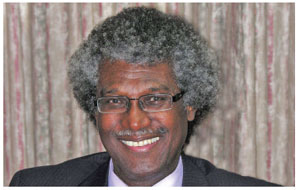
 I remember it well, as did everyone whose eyes witnessed the event. It was the ending of the 1980 Jamaica cricket season, and I was called upon to bowl the last over in a tense match between The University of the West Indies (The UWI), Mona Campus and Kingston Cricket Club at the University. I remember it well, as did everyone whose eyes witnessed the event. It was the ending of the 1980 Jamaica cricket season, and I was called upon to bowl the last over in a tense match between The University of the West Indies (The UWI), Mona Campus and Kingston Cricket Club at the University.
With the opposition requiring just a few runs to win and The UWI in need of the last wicket I nervously bowled the most ordinary, unacceptable of balls. It was wide and short outside the offstump and the batsman, seeing glory, looked to the point boundary and swung.
What followed was a bespectacled, excessively afroed, Venner in his customary second slip position diving full stretch to his left, eating grass along the way, and emerging from his undignified posture with ball held aloft!
The batsman stood his ground in shock and awe. But I had seen Venner do this kind of thing before. Everyone in the area, overwhelmed in jubilation, jumped upon Venner as he admonished us to watch out for his glasses. The umpire raised his finger. Then he calmly walked over to us and said to Venner, “I didn’t go to church this morning, but thanks to you I know that God is alive because I have just witnessed a miracle.”
This is how we knew the visionary Venner; always focused, always giving of his best for the team, always celebrated for his extraordinary efforts. The tale of the miracle in the middle of a dramatic moment is but a metaphor through which we can view the journey on earth of this spirit that was Sir Dwight.
Thousands of his cohort bonded with him at Mona as the 1980s transitioned the region. As some comrades stepped back and came forward as consultants, Venner’s vision was to think and act with consistent personal and public coherence. For him remaining true to core values was top priority. The praxis of economic development was always linked to his commitment to social justice. It was within this vortex of progressive possibilities that Venner was distinguished.
Sir Dwight traced the source of his tremendous courage and commitment to his “Mona making.” He loved his alma mater and came to see the future of the Caribbean through the lens it provided. Prepared well for public service, he began his monument building in the “Enterprise of the Indies,” as an economist who was later reinvented as a central banker. As Governor of the Eastern Caribbean Central Bank, and architect of the deeper integration of the OECS, he showed the wider region how to proceed with the functionality of regionality.
Working with his political and civil society colleagues he took the OECS out to the boundary’s edge of leadership in CARICOM and gave us all an example of what is possible with hard work, faith, trust and confidence. Here was a brother whose soul, heart, and intellect resided in the same space; he represented a unique integrity that rejected the contradiction between the personal and the public.
Sir Dwight was a leader in the generation that followed Sir Alister McIntyre and William Demas. Surrounded by intellects as sharply as Ralph Gonsalves and Keith Mitchell, he took to the development field with passion and determination to bat for his people in need of good runs as they moved to the rendezvous of victory. No region has ever prospered without the resolve of comrades such as Sir Dwight. No community can persist with resilience without the inculcation of his kind of consciousness in the spirit of those coming behind.
The UWI is honoured to have assisted in the making of a special son who was exclusively engaged in his service to region. All of us within the academy and beyond its boundaries shall miss the presence of his personhood, but we shall mightily remember with delight our Dwight. We salute the distinguished Venner family for their sharing of this special soul and we stand with them in both their reflection and celebration.
Professor Sir Hilary Beckles is the 8th Vice-Chancellor of The University of the West Indies. Prior to this, Sir Hilary was Principal and Pro Vice-Chancellor of the University’s Cave Hill Campus in Barbados for thirteen years (2002-2015) |





